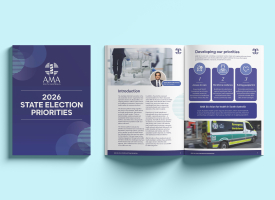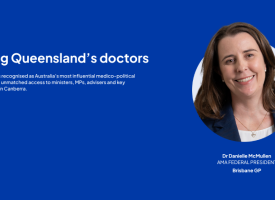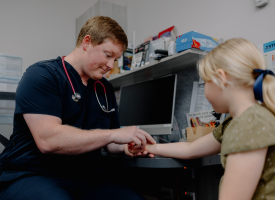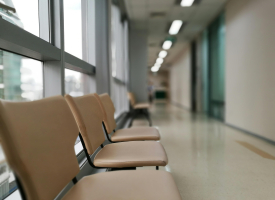Transcript: ABC Radio Adelaide - TGA warning on melatonin
AMA SA President Associate Professor Peter Subramaniam told ABC Radio Drive that clinical oversight is essential before taking melatonin or administering it to children.

Transcript: AMA SA President Associate Professor Peter Subramaniam on ABC Radio Drive with Spence Denny.
(30 September, 2025)
Subjects: melatonin, TGA, medical evidence, clinical oversight, online medication sales
Spence Denny: Now, this is in reference to a story that has been going for some time, and it's around the use of melatonin, which is obviously a product to try and help you get to sleep better. But the story yesterday, particularly that was done by ABC Online, is around the variety of dosage levels in melatonin you buy online.
A/Prof Peter Subramaniam: Yes, I think this is something that's been of concern for some time more generally in the AMA — this access to online medication. What happened yesterday was a formal safety warning urging Australians to stop using imported melatonin products because we don't know what these products contain. Some of these products have been lab tested and they don't contain any melatonin, and others have up to 400% more than the amount stated on the label. So it's this variability that's causing significant concerns. And we're very glad that the TGA has taken a formal step to advise on the online purchase of melatonin.
Spence Denny: I'm not sure what I'm more concerned about here, Peter — the variation that we see in this product, and I'm assuming other products might be similar, or the unregulated way that pharmaceuticals can suddenly be obtained online. Not just melatonin, but many other things you can buy online that you are trusting meets Australian requirements.
A/Prof Peter Subramaniam: And I think that's the key warning or concern we should have. We're very lucky in Australia — we have a TGA, which is an independent watchdog that looks at medicines and medical devices, and it only allows products that meet our national standards. The problem is when you start accessing products outside of the routine way in which you should obtain your medicines — which is with clinical oversight, someone prescribing it who knows the benefits of it and knows what dose to give you and what to watch out for in terms of side effects. When we go outside of that, we start exposing ourselves to safety issues. And this obviously is melatonin, which is in fact not a supplement, which is a common misconception. It's actually a hormone and it has real pharmacological effects.
Spence Denny: What are the potential risks of taking a medication like melatonin that has potentially 400 times what is described on the label?
A/Prof Peter Subramaniam: Yeah, so the risks — especially in the paediatric age group — include the usual things such as headaches, nausea, potential drowsiness, and so on. Fortunately, we don't see a significant amount of that. But concerns have been raised when it's been consumed without a knowledge of what is an appropriate dose. Again, Spence, I think the message here is quite clear. You know, if I was going to get my car fixed, I'd go to a mechanic who knew how to fix my car. If you want healthcare, you go to a healthcare professional. The online option is increasingly an unsafe option.
Spence Denny: Because it just seems like an easier option, doesn't it? So that — I mean, I guess it sort of goes along with the self-diagnosis, you know, consulting Dr Google.
A/Prof Peter Subramaniam: Yeah. And I think, you know, that's also not to be seen as unhelpful because people want convenience. Parents often want to be able to access medications easily for their children. And sometimes there's a cost benefit or the cost effect there as well. But what we did notice in researching the impacts of this is the Australian Poisons Hotline received nearly 1,500 calls about children ingesting melatonin in 2024. That's double the number from 2019, which is only five years. It shows us that there's a trend, and the trend is not without risk. So again, see your GP, get the right advice, and stick to the right advice. Don't be tempted by what appears to be an online story or something you've seen on Facebook because it's potentially dangerous.
Spence Denny: Speaking with Associate Professor Peter Subramaniam, who is President of the AMA in South Australia. Via text, Ria says: Many people who buy their melatonin online for autistic children have been advised by their paediatrician which brand to use. And then that advice is shared between families. Does that make it a safer option if a paediatrician is aware of a brand that is something that's available online?
A/Prof Peter Subramaniam: Yeah, that follows the principle of getting guided medical advice from a professional who's trained. And we have on our AMA council paediatricians who prescribe melatonin. And, you know, in my discussions with them, they've said to me, look, sometimes it's easier for parents to access this online when they know what they're getting. But the problem, of course, is being sure of getting what you're ordering. So we understand the attraction of online — it's easier and in many occasions cheaper — but melatonin is a Schedule 4 medicine. Under the PBS, it requires a prescription.
Spence Denny: So I guess the first step is really speaking to your GP about whether or not melatonin is going to be something that is going to be beneficial.
A/Prof Peter Subramaniam: Correct. Absolutely correct. Because as I said, it's a hormone, it's not a supplement, and it has benefits in children with autistic spectrum disorders where there might be associated sleep difficulties. But again, you would only prescribe melatonin to a child under the care of a GP or a specialist who knows how to manage the condition. We would strongly warn against do-it-yourself medicine — which is going to the website, Dr Google, deciding what is in the best interest of your child and doing it yourself — because it carries risks.
Spence Denny: Thank you, A/Professor Peter Subramaniam.



